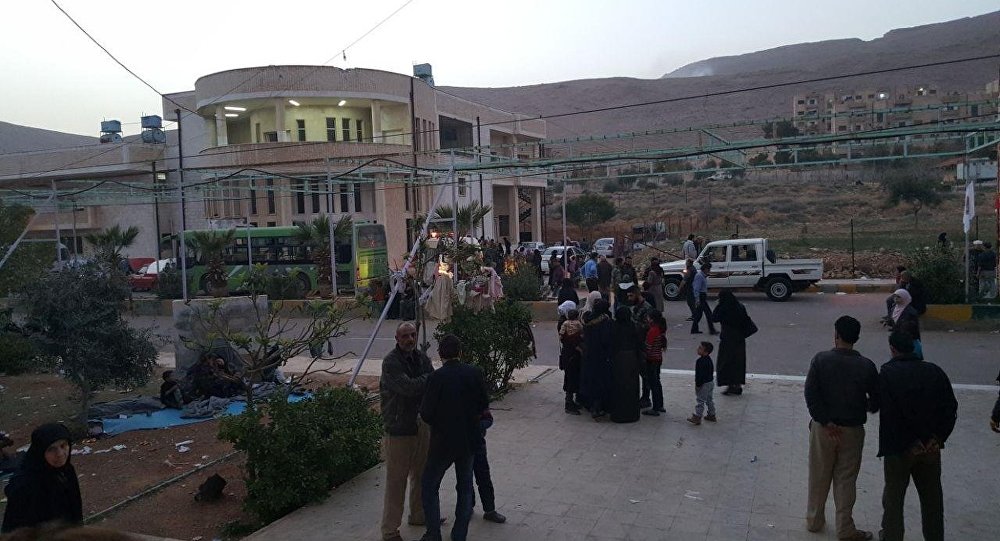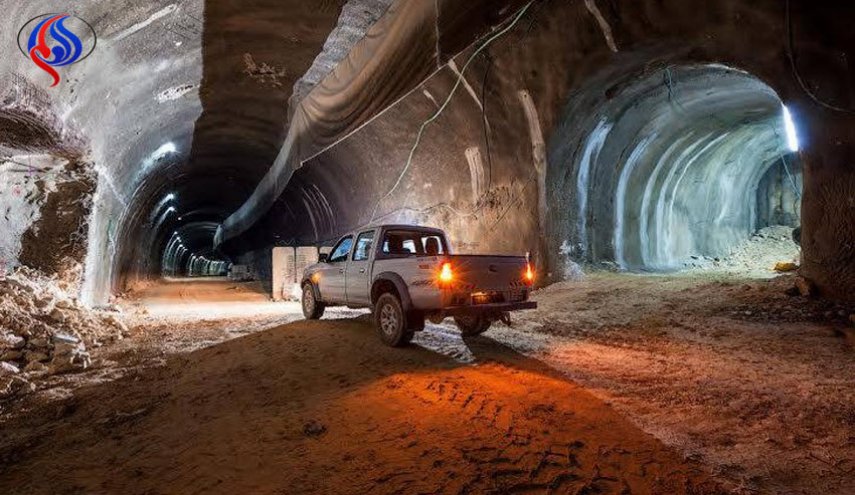Thousands of civilians in regime hands and increased media incitement

Mohammed Hamam Ziada
July 8,2018
As the regime gradually gained control of the cities and towns of Eastern Ghouta, southwest of Damascus, thousands of residents were forced to evacuate to the capital, Damascus. They went there because they did not want to leave the city they had lived in, despite the security risks that they could face with the Syrian regime’s security forces.
The regime had stated through its Al-Watan newspaper that nearly 42,000 people from the Ghouta area had arrived at the shelters the regime had set up. At the same time, sources close to the Russian Khmeimim Air Base and to Russian officials leading the reconciliation process have estimated that the real number of displaced people seeking shelter has exceeded 100,000 people.
Inhumane conditions
In the weeks following the evacuation of the residents of Ghouta, the displaced were distributed into multiple areas and shelters, such as the Dweir area in Adra, the Jirjala center in Damascus’s western countryside, as well as other centers within the heart of the capital.
"These places are like detention centers,” said one of the displaced individuals currently residing in the Jirjala center who declined to be named for security reasons. He added, “They’ve put us in a school and have distributed basic things such as mattresses and some blankets. But there’s poor sanitation and the toilets don’t work properly."
In terms of security, he says, “Security forces have repeatedly harassed us, we have been insulted and insulted by the Shabiha and the National Defense Forces in front of Red Crescent volunteers and employees." He added, “Males between the ages of 16-50 are often sent to be dealt with, some of whom are forced to sign papers stating that they cooperated with armed terrorist groups and are then arrested, and no one knows what fate they face so far."

The terrible conditions that the displaced are living in led United Nations Resident Coordinator in Syria, Ali al-Zaatari, to speak out in a media statement to AFP after he had visited some of the shelters. He stated that the conditions of the shelter in Adra were “tragic” and that it was not equipped to receive civilians. He added, "If I was a citizen, I would not accept to stay in Adra for five minutes. People may have escaped fighting, fear and insecurity but they find themselves in a place without anywhere to wash themselves.”
After a few short weeks, the regime allowed some residents to return to their homes after settling their accounts, such as the residents of the towns of Hamoura and Saqba.
One of the returnees said that they "accepted to return after seeing that life was impossible in the shelters, which were like a detention center,” adding that he “wanted to live in my demolished house. But I was surprised that my old furniture had been stolen, including the fans and the refrigerator. They left us nothing. But that’s ok. Life here is better than a collective life in the shelters. At least here you can enjoy some personal freedom inside your demolished and stolen home."
"Apart from the poverty and the lack of jobs, I’m afraid that my children will be sent to military service after their accounts have been settled," said Abu Kamal, questioning whether it was "reasonable, after what we have lived through over the past years, for them to take up arms and go to the front lines?"
A loyalist victory
With Eastern Ghouta being fully under control of the regime and its Russian patron, loyalists began holding large celebrations in the heart of Damascus and held pro-regime rallies. This prompted other loyalist groups to criticize the celebrations, saying they were not appropriate and noting the misery of the people of Ghouta who had arrived at the shelters.
At the same time, Syrian and Lebanese media channels close to the regime and Hezbollah launched an unprecedented media campaign. For example, they published dozens of reports about the tunnels in Ghouta that were used to smuggle food.
Mohammed Karkas, a photojournalist and media activist said to Suwar that he had “never seen media coverage this intense before. They photographed the tunnels that were used to bring in basic foodstuffs and medicine and then presented them as a creature from the myths.” He added that the objective of the coverage was to specifically target loyalists in order “to dehumanize the rebels and civilians living in Ghouta. After destroying and looting their cities, the regime wants to deepen the hatred against them."

"There were other media reports that showed large quantities of weapons that the regime's media claimed that the terrorists had left behind,” added Mr. Karkas, continuing that the reports sent a “clear message to its forces and militias, promoting hatred and violence against anyone from the areas that rebelled against the regime over the long term. This incitement will have long-standing effect, even if a political solution is reached in Syria."
Reconstruction
Syrian media have reported that the Council of Ministers held several meetings to draw up plans to reconstruct Eastern Ghouta and to restore its agricultural and vocational identity, which it has been known for, for decades. On the other hand, observers of Syrian affairs do not believe that the regime has the ability to make any real changes in Eastern Ghouta.
Mr. Karkas, who closely monitors Syrian affairs said, “We’ve grown accustomed to the statements of the regime, and circles close to Iran and Russia, about reconstruction and the rapid rehabilitation of many areas.” He continued, “If the regime was serious, it would have reconstructed Homs which has been under its control for several years, and the same for Aleppo. But the regime hasn’t even been able to remove the remnants of the bombing and destruction as of yet. These are all flimsy promises to his supporters and to businessmen close to him so that they would invest in economic projects in these areas.”
Mr. Karkas continues, “The major business people who have the financial means to support such projects won’t operate in these conditions. There is no trust in the regime.” He concluded, “The regime doesn’t want to take any real steps towards reconstruction. In reality, it really wants to continue its demographic engineering project that it started years ago and now wants to reap its rewards after sacrificing a lot for it. "



